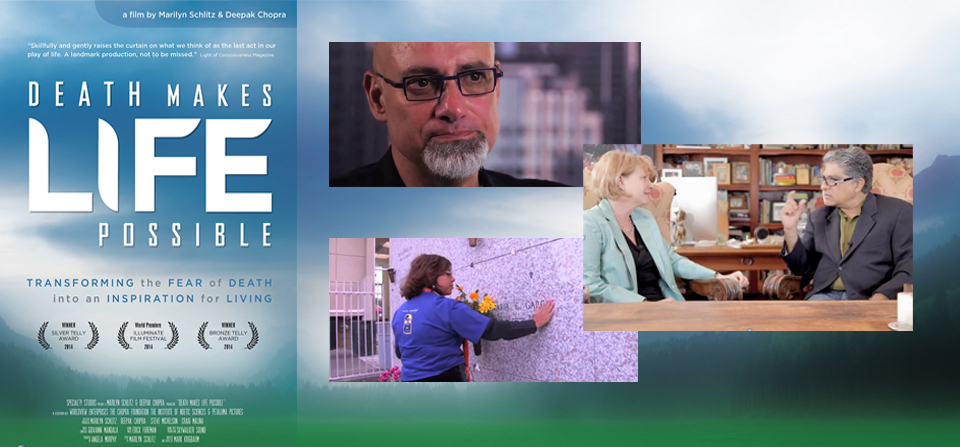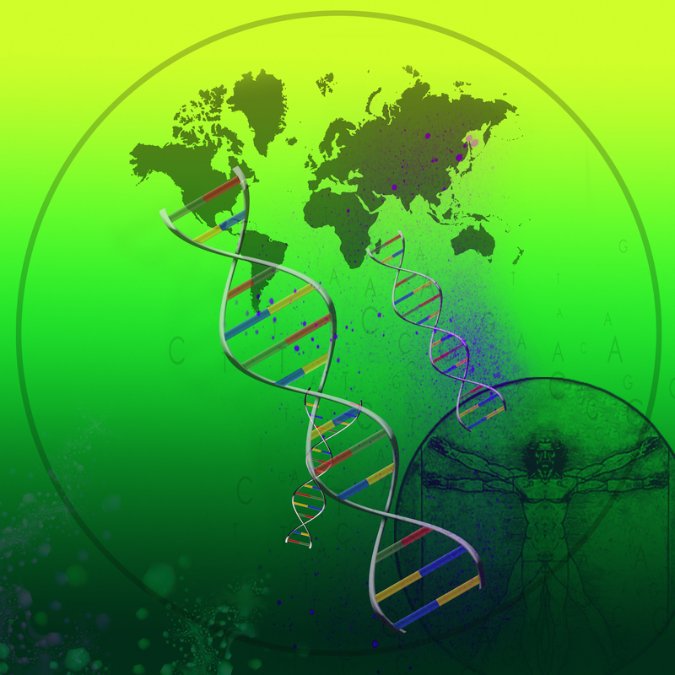A global movement to transform the fear of death into an inspiration for living and dying well. The DVD is now available on Amazon
Does Everything Happen for a Reason?
By Deepak Chopra, MD, and Jordan Flesher, MA Psychology
The human mind can adapt to almost anything, but not chaos. No one can lead a completely random and chaotic life. The messy room of a teenager may look completely chaotic, but even there a decision was made. The choice was to be messy rather than straighten up the room, and as long as choices exist, true randomness isn’t in charge.
Yet clearly there are random events in Nature, and a vast body of science is based on them, from the random collision of atoms to the random mutations that drive Darwinian evolution. It’s hard to square the randomness in Nature with the incredible orderliness of human thought at its best (allowance must be made, unfortunately, for our own random impulses, which can be capricious, self-defeating, and violent.) Science tends to ignore the fact that the researcher who is driving to work in order to study random particles isn’t heading for a random place on the map. He is guided by purpose, meaning, and direction.
In the last few posts we’ve been looking at how to break this deadlock through synchronicity, or meaningful coincidences. This is a perfect junction point, since “meaningful” has a purpose and “coincidence” is by definition random. What often accompanies experiences of synchronicity is a feeling of trust. The synchronous event seems to reveal to that there is a meaning, purpose, and direction “out there,” somewhere in a mysterious domain where the event was organized. This is what is meant when people say “Everything happens for a reason” – synchronicity is a reminder that randomness is being countered. But saying that everything happens for a reason isn’t provable. It exists as a shared belief, an article of faith, or wishful thinking, and sometimes all three.
Is Physics the Next Guru?
By Deepak Chopra, MD
The worldview of modern physics teases us with spiritual suggestions like the discovery—premature it seems—of the “God particle.” That nickname embarrasses some in the field, but ever since Fritjof Capra’s book The Tao of Physics, the links between Eastern spiritual traditions and the findings of quantum physics have been tantalizing.
Now they are much more than that. In three previous posts I’ve argued that synchronicity, the experience of a meaningful coincidence, points toward a new way of life, one where the strange and spooky behavior of the quantum domain can be used to change our view of everyday reality. There is a staunch band of physicists and their skeptic hangers-on who erect a brick wall between the quantum and classical domains, but more and more they are in the minority.
JUST Capital: The Next Revolution in Economic Wellbeing
Original Published on LinkedIn
By Deepak Chopra and Martin Whittaker[1]
Do you spend time socializing with people whose core values you question? Do you turn a blind eye when people you know act in ways you find fundamentally abhorrent? Probably not. Now, what if you knew a company was operating in a way that went against something you felt strongly about. Would you adjust your purchasing activity? Or would you prefer to buy from, or work for, or invest in those businesses operating in ways that align with your values? For us, the answer is yes – and that’s exactly how it should be. Companies should be rewarded for helping, not harming, our collective society.
Most of us think of corporations as our employers, or as the providers and manufacturers of countless products and services that we use to make our lives more convenient and comfortable. Often, we enjoy a transactional relationship with the brands we are loyal to, but in the rush of everyday routine we don’t stop to think about how these brands impact our society on a fundamental level.
Let’s say you are a self-identified environmentalist – someone who makes a conscious effort in your personal life to do things large and small that make a difference. Or maybe you care more about social issues, and are active in supporting underprivileged communities in your neighborhood. How do you know if you are making the right decisions as a consumer to buy products or services from corporations who share your concern for the environment? Likewise, how do you know if companies in your 401(k) retirement plan are paying a living wage to minority workers, or providing good benefits, or behaving in a manner consistent with your social values?
The truth is that outside of conducting extensive and time-consuming research, people do not know if corporations are acting in a way that aligns with their values – whatever they may be.
Recently, our friend, a devout capitalist and hedge fund scion Paul Tudor Jones announced the formation of JUST Capital[1], a new not-for-profit organization of which we are co-founder and Board member, and founding CEO, respectively. JUST Capital is dedicated to giving the American people a voice; to defining, measuring and ranking corporate behavior based on the preferences, attitudes and values of the public.
[youtube]https://youtu.be/GuyrJyyU3kQ[/youtube]
Paul Tudor Jones II: Why we need to rethink capitalism[3]
Courtesy of YouTube/JUSTCAPITAL
The ultimate goal is to drive more balanced and equitable company behavior using the power of the market. By creating a standard, transparent metric of just corporate practice – we’re calling it the JUST Index – we can empower consumers, employees, local citizens, investors, corporate leaders and other stakeholders to make decisions that better reflect their values, and in doing so drive prosperity and justness for us all.
[1] Deepak Chopra is co-founder and Board member of JUST Capital; Martin Whittaker is JUST Capital’s CEO.
[3] Originally Posted at TED.com. Interactive transcript can be found here.
TIME 100 PIONEERS – RUDY TANZI
Congrats to Rudy Tanzi who was recognized by TIME 100 Pioneers. Rudy is Co Chairman of the foundation’s SBTI research study and 2012 Recipient of the Rustum Roy Spirit Award acknowledged at Sages and Scientists Symposium 2012.

Alzheimer’s pioneer
I’m a child of Alzheimer’s, and I know firsthand how scary it is to watch the mind of someone you love get slowly erased. I also know that despite the fact that we’re in the middle of an epidemic, we simply don’t yet have the drive—or the drugs—to put an end to Alzheimer’s. But that doesn’t mean there’s no hope. Tanzi stands out as one of the few scientists who has committed his career to finding a cure for Alzheimer’s, and last year he brought us one step closer. In a truly remarkable feat, Tanzi created what’s been nicknamed “Alzheimer’s in a dish”—human brain cells that, in a petri dish, develop the markers of this terrible disease. This makes it possible for scientists to better study which of the countless drugs out there might actually slow or wipe out this mind-blowing disease.
Shriver is an author, the executive producer ofStill Alice and The Alzheimer’s Project and the founder of the Wipe Out Alzheimer’s Challenge
Illustration by Joel Kimmel for TIME
Originally posted on TIME – http://time.com/3823236/rudolph-tanzi-2015-time-100/?xid=emailshare


